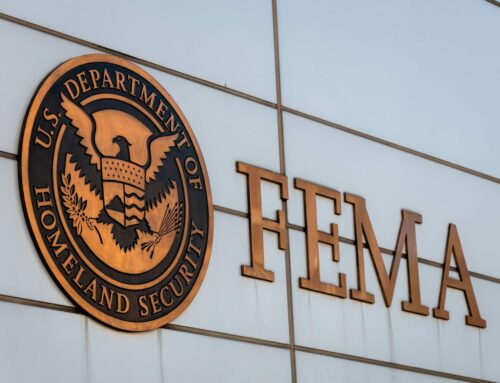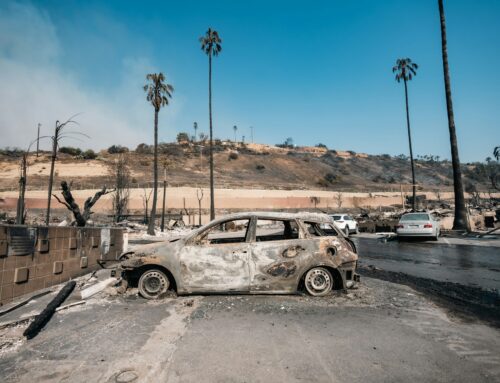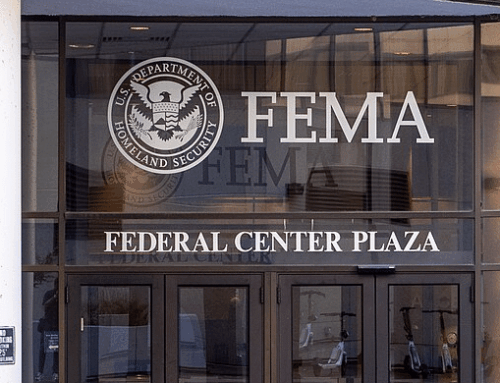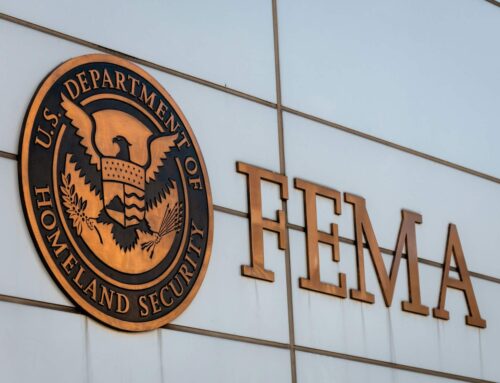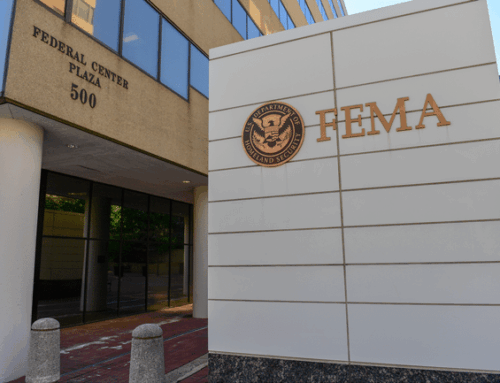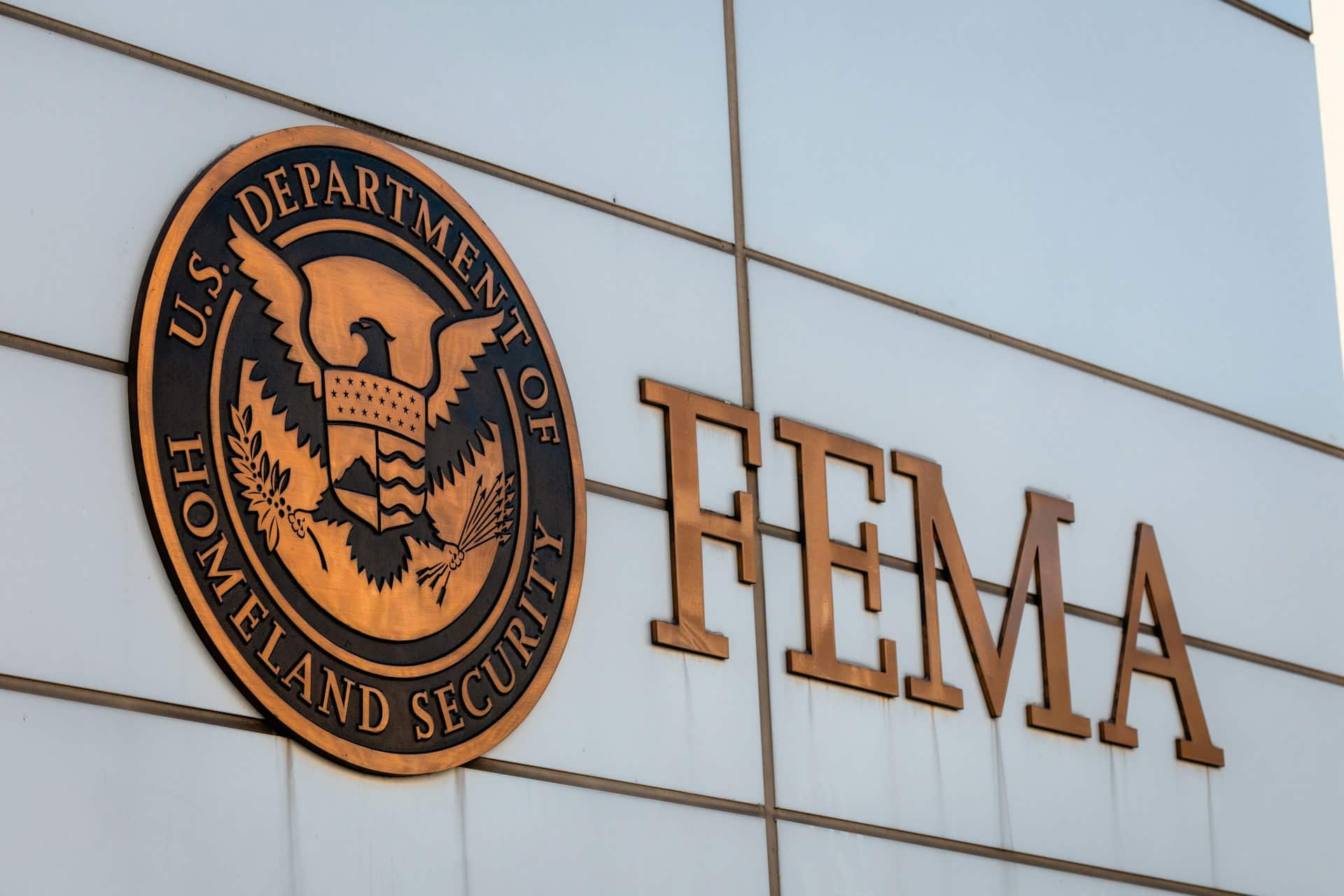Twenty years after Hurricane Katrina devastated the Gulf Coast, we’re still making the same costly mistakes. Despite spending over $122 billion on flood control since the 1920s, average annual flood damages had tripled even before Katrina hit. TCS Director of Research Josh Sewell joins host Steve Ellis to examine how moral hazard, poor planning, and recent policy changes are wasting taxpayer dollars while leaving communities more vulnerable than ever to increasingly frequent and severe disasters.
Transcript
Announcer (00:02):
Welcome to Budget Watchdog All Federal, the podcast dedicated to making sense of the budget spending and tax issues facing the nation. Cut through the partisan rhetoric and talking points for the facts about what’s being talked about, bandied about and pushed to Washington, brought to you by Taxpayers for Common Sense. And now the host of Budget Watchdog AF TCS President Steve Ellis.
Steve Ellis (00:40):
Welcome to All American Taxpayers Seeking Common Sense. You’ve made it to the right place for 30 years. TCS that’s Taxpayers for Common Sense, has served as an independent nonpartisan budget watchdog group based in Washington DC We believe in fiscal policy for America that is based on facts. We believe in transparency and accountability because no matter where you are in the political spectrum, no one wants to see their tax dollars wasted. August 29th will mark the 20th anniversary of Hurricane Katrina, making landfall along the Gulf Coast. 20 years ago, the images of a major American city underwater shock the nation’s conscience. More than 1200 Americans died, hundreds of thousands were displaced and direct damage costs exceeded $125 billion. But here’s what should really grab your attention as a taxpayer, despite spending more than $122 billion on flood control projects since the 1920s average annual flood damages had tripled even before Katrina hit. Today we’re asking a fundamental question After two decades and hundreds of billions of taxpayer dollars, have we learned to invest wisely in disaster preparedness or are we still paying premium prices for amateur hour planning? Joining me to examine this critical issue is TCS Director of Research and Policy, Josh Sewell. Josh, thanks for being here for this important anniversary.
Josh Sewell (02:15):
Thanks for having me, Steve. This is indeed a sobering anniversary and unfortunately it’s one that offers some hard lessons about how we spend taxpayer dollars on disasters.
Steve Ellis (02:26):
Josh, let’s start with the big picture 20 years after Katrina. What should taxpayers understand about the true cost of disaster response versus disaster preparation?
Josh Sewell (02:37):
Well, Steve, the numbers tell a stark story. Every dollar spent on mitigation, which is preparation before disaster strike, can save up to $13 in post-disaster recovery costs. But we consistently do the opposite. We underspend on the front end and overspend on the backend. It’s like refusing to buy insurance and then being shocked when you have to pay full price to rebuild after a fire. But it keeps happening again and again. And so after the great Midwest flood of 1993, some frequently flooded, Midwest towns were bought out and moved to higher ground. When floodwaters returned in 1995, there were zero flood losses in those communities. Zero because they were no longer in harm’s way. That’s an example of smart preparation, but it’s something that whether, it doesn’t always have to mean moving communities, but there’s other ways of mitigating. But it’s just something that we’re, we’re not doing enough.
Steve Ellis (03:33):
With Almar, Illinois and Arnold, Missouri.
Josh Sewell (03:35):
Those are powerful examples. Yeah, I can tell you Arnold Missouri is still there. I go through it all the time when I’m back in Missouri. It’s just those worst areas, those worst hit areas are no longer places where they built. The town is to the west, not by the river as much as it was.
Steve Ellis (03:52):
That is a powerful example. But Josh, we’ve seen this movie before, haven’t we? TCS was calling for exactly these foreign reforms back in 2006, right after Katrina. What we were saying then, what were we saying then, and why does it still matter today?
Josh Sewell (04:08):
So even back then at TCS, we were arguing for what we called evidence-based disaster response. We said Federal disaster assistance should be provided on a sliding scale that promotes pre-disaster planning and mitigation investment at the community and state level. So we wanted all assistance tied to concrete results, adoption and enforcement of adequate building codes, zoning regulations that promote safety, and long-term risk mitigation. The problem is we are still having the same conversation 20 years later, and I say we, I wasn’t a part of the we in 2006, I wasn’t at TCS, but we are now still having the same conversation. Now that I am, I guess an old hat in this issue now we’re still rebuilding in the same vulnerable places, often multiple times with the same taxpayer dollars.
Steve Ellis (04:58):
And that gets to something that should outrage every taxpayer we’re essentially subsidizing bad decisions. Can you explain how the current system actually incentivizes risky development?
Josh Sewell (05:11):
Yeah, it’s the classic moral hazard problem, Steve, something that we talk about a lot in political science, but also in insurances. When you know the federal government will bail you out after a disaster, you have less incentive to avoid the risk in the first place. It’s like driving recklessly because you know someone else will pay for any repairs that might happen. I saw that the National Hurricane Center actually exhausted its list of storm names in 2005 and had to start using Greek letters. I’d like to point out that that wasn’t a fluke. It was a preview of our new normal where there’s lots of more named storms every year, most years. But instead of adapting our policies to this new norm, we’ve kept doing the same thing and expecting different results.
Steve Ellis (05:58):
Josh, let’s talk about the US Army Corps of Engineers because they play a huge role in the story. What did we learn about their approach from Katrina?
Josh Sewell (06:07):
So the Corps has been building levees since the 19th century. Steve, you know this, and it was core levees that failed and inundated New Orleans. But here’s the thing. The core likes to build things. That’s what they do. The problem is, as we noted back when Katrina occurred, if you build a levy, they will come. Without strong restrictions, new flood protection actually induces development and puts more people in harm’s way for what’s going to be an inevitable storm. At some point, another storm will come and it will test those protection systems. So independent engineering panels actually found that the major levee failures in New Orleans occurred because of faulty design, construction or maintenance, not over topping. Over topping is when you have so much water that the water actually goes over the levee and it can cause the levee to fail. That wasn’t the cause in New Orleans during Katrina. The Government Accountability Office and other agencies identified a tendency for the core to exaggerate project benefits, underestimate environmental costs and favor large scale structural projects like big levies and pumps that generate more work. The Government Accountability Office and other agencies have routinely identified a tendency for the court to exaggerate project benefits, underestimate costs, and just sort of favor large scale solutions, structural solutions that generate more work. And sometimes that’s not the best solution that you need for a problem.
Steve Ellis (07:35):
So we’re talking about a system that’s essentially designed to perpetuate itself regardless of whether it’s actually protecting taxpayers or their communities effectively.
Josh Sewell (07:44):
Exactly. And it gets worse when you consider the opportunity cost. And so every dollar that we spend rebuilding the same vulnerable infrastructure as it was when it failed or didn’t meet the needs we needed it to, is a dollar we’re not spending on genuine resilience measures that would actually reduce future costs by making that infrastructure stronger and better.
Steve Ellis (08:07):
Alright, let’s fast forward to today, Josh. We’re now facing what Noah Predicts will be an above normal hurricane season with up to 19 named storms and as many as five major hurricanes. But this time we’re doing it with a fundamentally different approach to federal disaster response. Can you explain what has changed?
Josh Sewell (08:28):
I’ll try. So we talked about this a couple podcasts ago. The current administration has proposed essentially dismantling FEMA as we know it, and replacing it with a block grant system. So under a block grant approach, taxpayers would still pay federal taxes for disaster response, but instead of getting coordinated federal assistance with trained personnel from FEMA and other agencies and the institutional knowledge that comes with that professional training and continuity of service, states would just get cash and be told to figure it out yourself. And so the Urban Institute looked at the year 2019 as a test case for this scenario, and they actually found that under these proposed changes, states would have lost access to nearly $1.3 billion in federal disaster funding. And I believe it was only five out of 31 affected states actually had enough money set aside to cover what they would have lost. So it’s a big cost.
Steve Ellis (09:29):
Yeah and certainly states need to have some predictability, have some idea of what’s going to happen. This time last year there was no block granting or anything. So when they’re coming up with their budgets, they’re not trying to figure out how to do this additional assistance and work. And we’ve definitely said that states need to have more skin in the game. We said that on that podcast, but this seems like a recipe for disaster, if you pardon the expression. There’s another angle here that should concern taxpayers. We’re still paying for FEMA, but FEMA increasingly isn’t showing up when disaster strikes what’s happening there.
Josh Sewell (10:07):
I mean, it’s outrageous from a taxpayer perspective. In Missouri, my home state, St. Louis faced a deadly tornado in May that killed five people and caused at least $1.6 billion in damage. FEMA didn’t deploy for three weeks, leaving local first responders to handle search and rescue sheltering and the debris cleanup all on their own. The mayor said, our cities aren’t equipped to deal with thousands of displaced people overnight. And that’s true. I don’t know if any city is equipped for that. But here’s the kicker, taxpayers are still paying full freight for FEMA. If you’re paying for a service and not getting it in any other context, I think we’d call that fraud.
Steve Ellis (10:51):
And Josh, there’s another element to this that shows just how dysfunctional the current approach has become. Can you tell our listeners about what happened with disaster declarations?
Josh Sewell (11:04):
This is where it gets truly bizarre. Steve, the Washington Post found that the White House is now approving disaster declarations without even notifying FEMA. Virginia got federal aid approved in April. The governor issued press releases. Local news reported funding was coming. But FEMA itself actually found out by reading the headlines days later. Frankly, it’s insane. We’re running disaster policy by social media posts while people are drowning. And the White House has told FEMA that the president doesn’t have to follow the agency’s recommendations and won’t justify his decisions when he denies aid. We’ve gone from evidence-based disaster response to pure presidential whim, and it’s not helping people who need help.
Steve Ellis (11:53):
So let me get this straight. Taxpayers are paying for an expert agency with decades of institutional knowledge, but political appointees are making decisions without consulting that expertise. And they don’t even have to explain their reasoning. That’s not fiscal responsibility, that’s fiscal negligence.
Josh Sewell (12:10):
Absolutely. And the human cost is devastating. Obviously, we are a fiscal group. We’re really concerned about spending, but spending affects lives. And in disaster response and preparation, failure has immense cost, not just in property. On July 5th, the day after deadly Texas floods, as we all remember, are still fresh in many of our minds. The administration let contracts expire for hundreds of workers managing FEMA’s disaster assistance hotline. So in the middle of an active disaster, they essentially fired the people answering the phones. FEMA could only answer a fraction of the thousands of calls that they were getting.
Steve Ellis (12:52):
Josh, as we mark this 20th anniversary of Katrina, what should taxpayers demand from their representatives when it comes to disaster policy?
Josh Sewell (13:05):
First, demand transparency. Every federal disaster dollar should be tagged and tracked from federal coffers to the ultimate recipient. Too often Congress writes these big checks after disasters and moves on. We’re 20 years after Katrina and some of the money appropriated by Congress still hasn’t been spent. Second, taxpayers should demand that disaster spending actually reduces future disaster costs. We need policies that promote planning and mitigation with federal assistance provided on a sliding scale that rewards states and communities that invest in resilience measures upfront. Things that are proven to protect people better, to protect property and reduce costs in the future. Third, we all need to demand that we stop subsidizing bad decisions. Federal funds should not support choices by individuals and communities that will likely require future federal funds to recover from inevitable disasters.
Steve Ellis (14:21):
And what about the current proposal to eliminate FEMA? Is there a middle ground that serves taxpayers better?
Josh Sewell (14:27):
Yeah, I think so. FEMA is not perfect. Let’s be clear about that. We’ve at taxpayers for a long time called for reforms at FEMA and other agencies. But the answer isn’t to throw the baby out with the bathwater. There are bipartisan proposals in Congress right now, like one from Transportation and Infrastructure Committee chairman Mr. Graves and ranking Member Larson, that would make FEMA an independent cabinet-level agency like it used to be and include some important reforms. But the key here is making FEMA more effective, not eliminating the institutional knowledge, that coordination capacity that taxpayers have spent decades building.
Steve Ellis (15:11):
I know we said this in the last podcast on this issue, but I think the thing is, remember major disaster declaration is that it’s exceeded the ability of the state to actually respond and it needs to have federal assistance. So just handing them more cash doesn’t actually add more bodies, doesn’t add more sophistication, doesn’t add more equipment in the short term. And so it’s really about having a more effective FEMA that deliver that service to these communities than it is about just handing over more dollars.
Josh Sewell (15:41):
And this is one of the areas where you can’t emphasize enough the importance of planning before it happens. And that is FEMA can have a dual role of being more effective, potentially being more effective at responding when a disaster does occur, because we’ve seen this before flooding. Sure, the exact circumstances in your community are unique, but flooding happens in every state every year. So we have experience with this. But it also can facilitate the lessons learned from all these different disasters and be a place where it can help communities when the sky is clear, when the water’s low, and you can make these planning decisions before you’re under the pressure of actually trying to physically save people and protect people’s lives. And so it can do both. It can potentially respond better, but can also plan for that response at the same time. And it’s going to take a bipartisan work to do that. And let’s be honest, I mean there’s not a lot of bipartisanship it feels like right now, but in disasters it affects everybody and there is movement on committee itself, committees of jurisdiction to get some solutions out there.
Steve Ellis (16:52):
Alright, Josh, as we wrap up, what’s the bottom line for taxpayers on this 20th anniversary of Katrina?
Josh Sewell (16:58):
The bottom line disasters are going to happen. Climate change is making them more frequent and more severe. Question isn’t whether taxpayers will pay. We will. The question is whether taxpayers will pay smart money upfront for genuine preparedness and mitigation or premium prices afterward for that emergency response and repeated building the same vulnerabilities that we’ve had forever. 20 years after Katrina, we have the knowledge and tools to do this, right? What we need is the political will to prioritize that long-term taxpayer value over short-term political convenience. Every dollar spent on mitigation remember, saves up to $7 in recovery costs $13, depends on how you look at it. That’s not just good disaster policy. That’s good fiscal policy. Taxpayers deserve leaders who understand that distinction.
Steve Ellis (17:49):
Josh, thanks for joining me on the eve of this important anniversary to examine these critical issues.
Josh Sewell
Thanks for having me, Steve.
Steve Ellis
Well, there you have at podcast listeners, 20 years after Hurricane Katrina, the fundamental choice remains the same. Pay now for smart preparation or pay much more later for emergency response and repeated recovery. Taxpayers deserve policies that invest their dollars wisely upfront rather than waste them on the backend. This is the frequency. Mark it on your dial. Subscribe and share and know this: Taxpayers for Common Sense has your back America. We read the bills, monitor the earmarks, and highlight those wasteful programs that poorly spent our money and shipped long-term risk to taxpayers. We’ll be back with a new episode soon. I hope you’ll meet us right here to learn more.

